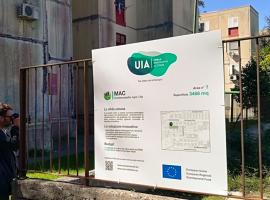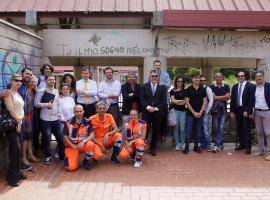MAC Project ZOOM-in 3: The protagonists pass on the acquired knowledge
The main novelty of this project is realized through an action to relaunch the local economy based on urban agriculture. Urban agriculture that is not considered only as a social and aggregative function at the service of the local community (as often happens in the urban regeneration of neighbourhoods in crisis) but as a catalyst for economic development and also as a transformer of the urban landscape.
Monterusciello, a real new town built in the early 1980s in response to the serious bradyseism that had affected the historic center of Pozzuoli, in its strictly modernistic design and conception and inspired by the measurements of ideal cities of classicism, it had at his disposal extensions and public land, unfortunately completely abandoned, for many years. Through the MAC project, this public heritage once again becomes a community asset; a productive and support space for the conception of a new model of urban landscape and economies.
An urban landscape capable of responding to the needs of aggregation and leisure of the local community, the needs of creating local economy to support primarily the inhabitants of Monterusciello and the creation of shared spaces, as for instance, the recovery of Piazza de Curtis, which can be used to increase the dialogue between civil society, private and public institutions, and therefore increase citizens' participation in decision-making processes, through the establishment of the Agro Urban Center and the Urban Council.
This zoom in, the last of the three products, wants to go inside the knowledge generated by the MAC experience giving voice to its protagonists, especially to the project partners who actively and concretely supported the initiative undertaken by the Municipality of Pozzuoli. With the hope that this acquired and tested knowledge, during the implementation process, will be of help to other European cities, but also to many other territorial realities outside the European Union. The partners will focus in the interviews:
- on aspects related to design
- active involvement of the local community and experiences of participation
- the challenges encountered in the management of this complex operation
- the significant training work carried out to increase the capacity of human capital at the Monterusciello scale
- the possibility of continuing the regeneration and economic revitalization of the neighborhood even after the end of the UIA financing, through the indirect structural funds and the dialogue with and the Region of Campania
- the actions put in place to identify and launch the tools for the sustainable, transparent and shared management of this public heritage
- finally, the aspects related to the environmental impact of these agricultural productions based, some of them, on the permaculture methodology.
In summary, to go into an application knowledge, based on the real problems encountered by the partnership in carrying out the project activities, a set of operational knowledge that can be of help for others cities has been extracted. In particular regarding:
- the design used
- the management
- the human capital, participatory decision-making, of proposing economically and financially sustainable actions in the medium-long term,
- the investment in human and territorial capital,
- the respecting the environment and the landscape
and the promotion of urban agriculture with low environmental impact and a strong enhancement of local production and economies.
Enjoy this video zoom in…it is a 25 minutes-long documentary.
















